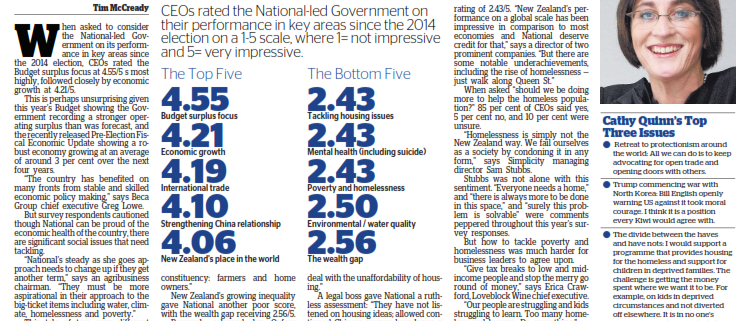http://bit.ly/TimMcCreadyReportCard
Tim McCready
When asked to consider the National-led Government on its performance in key areas since the 2014 election, CEOs rated the Budget surplus focus at 4.55/5 most highly, followed closely by economic growth at 4.21/5.
This is perhaps unsurprising given this year’s Budget showing the Government recording a stronger operating surplus than was forecast, and the recently released Pre-Election Fiscal Economic Update showing a robust economy growing at an average of around 3 per cent over the next four years.
“The country has benefited on many fronts from stable and skilled economic policy making,” says Beca Group chief executive Greg Lowe.
But survey respondents cautioned though National can be proud of the economic health of the country, there are significant social issues that need tackling.
“National’s steady as she goes approach needs to change up if they get another term,” says an agribusiness chairman. “They must be more aspirational in their approach to the big-ticket items including water, climate, homelessness and poverty.”
This tale of two very different report cards is obvious in the survey, with National’s performance tackling housing issues (2.43/5), environmental/water quality (2.50/5) and poverty and homelessness (2.43/5) among the five lowest scoring areas.
“There are plenty of gaps starting to appear,” says an automotive chief executive. “They have not addressed environment and housing that well as they don’t want to offend their constituency: farmers and home owners.”
New Zealand’s growing inequality gave National another poor score, with the wealth gap receiving 2.56/5.
Research released by Oxfam earlier this year showed the richest 1 per cent hold 20 per cent of the wealth in New Zealand, while 90 per cent of the population owns less than half of the nation’s wealth.
ICBC chairman Don Brash says many of these issues are interlinked, with housing the crux of the problem: “increasing wealth inequality, poverty and homelessness are all a direct result of the Government’s failure to deal with the unaffordability of housing.”
A legal boss gave National a ruthless assessment: “They have not listened on housing ideas; allowed continued Chinese money launderers a free pass via housing access; missed opportunities to intervene in the market as Australia, Hong Kong and Singapore have done; messed up citizenship and residency revenue and allowed Auckland Council to continue to mess up the city.”
Poverty and homelessness was rated by CEOs as one of the Government’s poorest performing areas since the 2014 election, receiving a rating of 2.43/5. “New Zealand’s performance on a global scale has been impressive in comparison to most economies and National deserve credit for that,” says a director of two prominent companies. “But there are some notable underachievements, including the rise of homelessness — just walk along Queen St.”
When asked “should we be doing more to help the homeless population?” 85 per cent of CEOs said yes, 5 per cent no, and 10 per cent were unsure.
“Homelessness is simply not the New Zealand way. We fail ourselves as a society by condoning it in any form,” says Simplicity managing director Sam Stubbs.
Stubbs was not alone with this sentiment. “Everyone needs a home,” and “there is always more to be done in this space,” and “surely this problem is solvable” were comments peppered throughout this year’s survey responses.
But how to tackle poverty and homelessness was much harder for business leaders to agree upon.
“Give tax breaks to low and mid-income people and stop the merry go round of money,” says Erica Crawford, Loveblock Wine chief executive.
“Our people are struggling and kids struggling to learn. Too many homeless and hungry. Do something.”
The challenge now for National is to clarify what their vision for the future is – for both New Zealand and New Zealanders, explains Deloitte chief executive Thomas Pippos. “They need to capture the hearts, souls and minds of the voting public around it – not straightforward for anyone given the shallow decision-making criteria it seems the average voter adopts.”
Cathy Quinn’s Top Three Issues
Retreat to protectionism around the world: All we can do is to keep advocating for open trade and opening doors with others.
- Trump commencing war with North Korea: Bill English openly warning US against it took moral courage. I think it is a position every Kiwi would agree with.
- The divide between the haves and have nots: I would support a programme that provides housing for the homeless and support for children in deprived families. The challenge is getting the money spent where we want it to be. For example, on kids in deprived circumstances and not diverted off elsewhere. It is in no one’s interest to simply provide dollars without a degree of confidence that it ends up helping those who are most in need. Fundamentally, as a society I believe the majority want to see the vulnerable looked after appropriately. We find it abhorrent – for whatever reason – that kids have no home, damp homes, insufficient food, no shoes. That is not the NZ most of us want.




Leave a Reply
Want to join the discussion?Feel free to contribute!